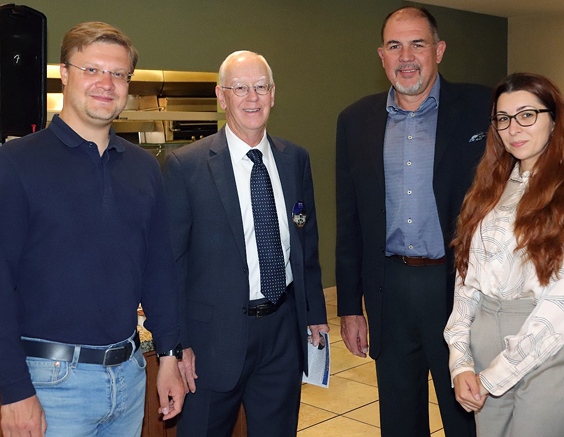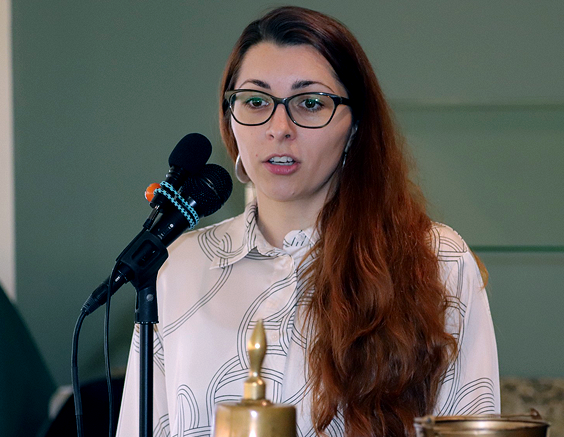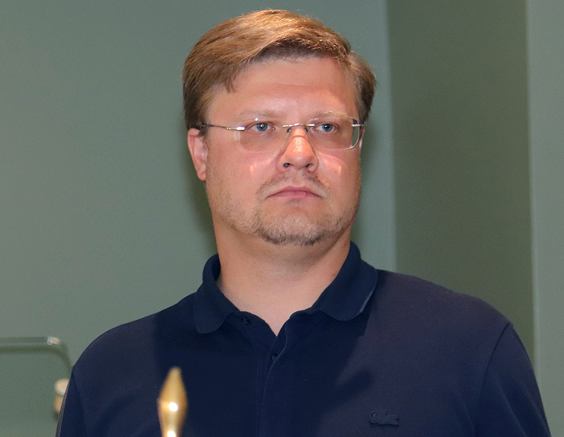May 20, 2022
Valeriia Hesse and Kirill Iliin
On May 12, 2022, CNS Visiting Fellows Valeriia Hesse and Kirill Iliin gave a talk to The Monterey Rotary Club outlining their perspectives as a Ukrainian and a Russian on the war in Ukraine.

Valeriia and Kirill explained the alignment of forces at the beginning of the Russian offensive, at the time when Russian forces left the northern part of Ukraine, and the situation up to date. They highlighted the humanitarian crisis with 6 million refugees leaving Ukraine and 7.7 million people displaced within the country, of which 90% are women and children. They drew attention to the gravity of the situation in Mariupol and occupied Kherson, and emphasized that while shelling continues in Kharkiv, Odesa, Lviv, and in other parts of the country, that nowhere is safe anymore. Valeriia and Kirill made a passionate appeal to the Rotarians on how President Putin misguided goals of the offensive. Claims were made of saving people from genocide, when it is in fact President Putin’s forces who are committing war crimes and acts of genocide that have left tens of thousands dead, including the personal friends and acquaintances of the two Fellows.
The Monterey Rotarians were also briefed on the destructive nature of the war for Russia itself. Russia’s economy is suffering the largest fall since the collapse of the Soviet Union. Achievements to date have been largely lost, while opportunities are wasted for many generations of Russians to come. Around 9 million young, highly educated, and entrepreneurial citizens have left the country in the last two years. The state-affiliated sociology does not fully represent the reality in Russia since freedom of opinion is limited under fears of persecution. People do not actively participate in political life or challenge current policies for these reasons.

CNS Visiting Fellows Valeriia Hesse
The Fellows addressed the threat represented by the Russian invasion to the global nuclear order and security. In this context, they highlighted that attacks on and seizures of nuclear power plants emphasize the importance of establishing new norms on nuclear safety and security in war zones and demonstrates that nuclear terrorism can be state-sponsored. Additionally, they referred to the violation of Budapest Memorandum, and the impact of the Russian invasion on the continued relevance of positive and negative security guarantees. This, they emphasized, could trigger a dangerous message for other nations facing powerful nuclear-capable adversaries. In general, the Fellows considered the international security architecture as limited in its capability to mitigate the situation. The UN Security Council is deadlocked by the existence of veto power, while the war in Ukraine is more than a local conflict (unlike e.g. Syria). Most notably, it makes all Russia’s agreements with all countries weaker, exposes the UN and international law flaws, and changes the post-World War II order. It could also fuel regional conflicts, with ever increasing concerns about triggering World War III. Furthermore, the Fellows stressed that the invasion threatens global hunger, economic stability, prices, and supply chains. It disrupts global logistics and perspectives for international development, making the future unstable for everyone.

CNS Visiting Fellow Kirill Iliin
Valeriia and Kirill emphasized that the stated goals of the aggression mean loss of independence and statehood for Ukraine and nationhood for Ukrainians if Russia manages to attain the region. Recent publications and claims of high-ranking officials in Russian state-sponsored media, like RIA-novosti (Sergeitsev), confirm that Russia’s control over Ukrainian territories means genocide and destruction of Ukrainian identity. This has left Ukraine with no choice but to fight until victory happens on its terms. The presentation reminded that this war is not only about protecting Ukraine, but also about fighting for democracy and the rule of law as the whole situation started with Ukraine wanting to integrate with the democratic nations of the European Union in 2013.
The Fellows also drew attention to the importance of not succumbing to “Ukraine fatigue,” and stressed that the best ways to support the plight of Ukraine and its people are to ensure continued military aid to Ukraine; cut Russian military spending by limiting its revenue through oil and gas embargo; supporting individual Ukrainians and refugee communities; and donating to those who can help them or any other cause. To that end, the Fellows informed the Rotarians that they have set up an NGO called Ukraine Aid. Community (UA.C), whose mission is to employ project management and logistics capabilities to ensure accurate and timely delivery of much needed humanitarian aid and other supplies to the Ukrainian people.
The two CNS Visiting Fellows are grateful to Jean du Preez and Monterey Rotary Club for this opportunity, the warm welcome, and the support they received.
